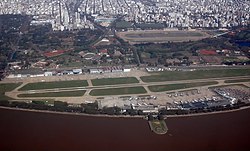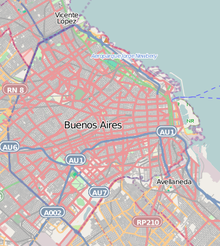Jorge Newberry Airport
|
Jorge Newbery Airfield Aeroparque "Jorge Newbery" |
|||||||||||
|---|---|---|---|---|---|---|---|---|---|---|---|
 |
|||||||||||
| Summary | |||||||||||
| Airport type | Public / Military | ||||||||||
| Operator | Aeropuertos Argentina 2000 S.A. | ||||||||||
| Serves | Buenos Aires, Argentina | ||||||||||
| Elevation AMSL | 5 m / 18 ft | ||||||||||
| Coordinates | 34°33′32″S 058°24′59″W / 34.55889°S 58.41639°WCoordinates: 34°33′32″S 058°24′59″W / 34.55889°S 58.41639°W | ||||||||||
| Map | |||||||||||
| Location of airport in Buenos Aires | |||||||||||
| Runways | |||||||||||
|
|||||||||||
| Statistics (2016) | |||||||||||
|
|||||||||||
|
Sources: Argentine AIP ORSNA
|
|||||||||||
| Total passengers | 11,662,525 |
|---|
Jorge Newbery Airfield (Spanish: Aeroparque "Jorge Newbery", IATA: AEP, ICAO: SABE) is an international airport located in Palermo neighbourhood, 2 km (1.2 mi) northeast of downtown Buenos Aires, Argentina. The airport covers an area of 138 hectares (341 acres) and is operated by Aeropuertos Argentina 2000 S.A. It is located in the Palermo ward, along the Río de la Plata, and serves as the main hub for domestic flights from Buenos Aires as well as to Uruguay, Bolivia, Brazil, Chile and Paraguay. The airport is named in honor of Argentine aviator Jorge Newbery.
The Argentine Air Force Station located on the eastern end of the airport is where authorities normally board the Tango 01 presidential aircraft.
Newbery Airfield is roughly equal to Ezeiza International Airport (located 38 km (24 mi) to the south) in airline traffic among the nation's 33 airports, handling 93,346 aircraft movements in 2009 and serving 10,255,541 passengers in 2014 (one third of all scheduled air traffic in Argentina, the first Argentine airport to pass the 10 million passenger mark in history); it thus surpassed Ezeiza International in 2013 as the nation's busiest airport by passenger traffic. In 2015, Aeroparque Jorge Newbery was again Argentina's busiest airport, having handled 11,052,861 passengers, relegating Ezeiza International Airport again to the second place, with 9,127,908 passengers handled.
The airport was originally proposed by Mayor Carlos Noël in 1925. A number of feasibility studies and zoning disputes followed. In 1938, plans were submitted for an island airport connected via causeway to Avenida General Paz (then under construction). A former wetland reclaimed in 1916 from the Río de la Plata and closer to downtown was selected instead, and the facility, designed by Aeronatics Secretariat engineer Víctor Acuña in 1945, was inaugurated in 1947 as Aeroparque 17 de Octubre (17 October Airfield).
...
Wikipedia

